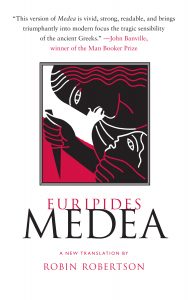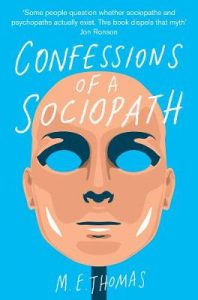“America loves a successful sociopath,” wrote Gary Indiana in Three Month Fever. And why wouldn’t we? They make such great protagonists. The actual, clinical definition of sociopathy is complex and hotly debated, but its cultural definition is satisfyingly simple: a human monster, one incapable of guilt or empathy. Fictional sociopaths let us see the darkest parts of ourselves writ large. They make outrageous choices, which in turn drive outrageous plots.
According to Dr. Robert C. Hare, who invented the Psychopathy Checklist, the ratio of male to female psychopaths is seven to one. Perhaps consequentially, the female sociopath rarely appears in literature. When she does, she’s a refreshing, even radical presence, because she differs so profoundly from the heroines we’re used to reading. Unchecked by guilt or pity, she can reach unapologetically for what she wants, act on utter self-interest. At times, in her ruthlessness, she can seem like a radiant fantasy of feminist rage unleashed. She might not be someone you’d want as your best friend. She might not even be someone you’d want in the same room. But she’s a dynamic and fascinating character you’re unlikely to forget in a hurry.

Medea by Euripides
Greek mythology is full of minotaurs and sea monsters, but none of them are quite as frightening as Medea, a villain so enduring she’s even namechecked in season one of True Detective. Her disturbing tale was recounted by Hesiod as early as 700 BC, but she was immortalized in Euripides’ eponymous tragedy. During the hero Jason’s quest to claim his rightful throne, he must retrieve the golden fleece, which King Aeëtes of Colchis promises him in exchange for completing several seemingly impossible tasks. Medea, the King’s daughter falls in love with Jason and decides to help him. In different versions of the story, Medea’s assistance ranges from magical potions, to trickery, to murdering her brother and scattering his remains in order to distract her father. Whatever she did, it worked, and she and Jason marry and flee to Corinth, where they have fourteen children. However, Jason betrays Medea, and in her rage, she kills both her romantic rival and her own children. All in all, not exactly a fairytale ending.

The Bloody Countess by Alejandra Pizarnik
The Bloody Countess is Alejandra Pizarnik’s poetic interpretation of the life and crimes of Erzebet Bathory, perhaps the most famous of female serial killers. If contemporary popular culture is guilty of romanticizing serial killers, it still has nothing on Pizarnik, who describes Bathory as “a silent woman of legendary pallor, with lunatic eyes and sumptuous, raven-colored hair.” Does the fact that Bathory’s crimes took place four hundred years ago make that slightly less distasteful? If not, you might want to skip this one. If you can stomach it, though, the prose is astonishing, filled with phrases like “ravishingly sad music” and “the violent perfume of the magical herbs.” The contrast between the beauty of the language and the ugliness of Bathory’s crimes is what makes this short piece so chilling and unforgettable.

Girl, Interrupted by Susanna Kaysen
You’re probably familiar with the film version of Kaysen’s memoir, which is, frankly, a dumbed-down adaptation of an excellent memoir. Kaysen’s personal journey is poignant and inspiring, and her observations about psychiatry remain vital and prescient. While institutionalized at the famous McLean Hospital in Massachusetts, Kaysen befriended a diagnosed sociopath named Lisa. Lisa is proud of her diagnosis. “We are very rare, and mostly we are men,” she brags. (Statistically speaking, she;s not wrong.) She proves it by never sleeping, burning herself with cigarettes, showing off her track marks, and constantly running away from the hospital. Kaysen admits to being totally charmed by her: “She was funny. I can’t think of her without smiling, even now.” We all know from television that sociopaths are often charming, but Kaysen depicts Lisa as something else, as well: a beacon of self-certainty in a world in which self-certainty is almost impossible.

Gone Girl by Gillian Flynn
In David Fincher’s movie adaption of Gillian Flynn’s novel, Amy Dunne’s infamous “cool girl” speech is cut down, which I think was a mistake. One of the many lines omitted is: “He says things like: ‘I like strong women.” If he says that to you, he will at some point fuck someone else. Because “I like strong women” is code for “I hate strong women.” Amy’s primary motivation throughout both narratives is rage. In the movie, her rage is flattened somewhat, to make her a more recognizable character, the woman scorned who we’ve seen so many times. In the book, however, her anger is not just personal but cultural. I’m not saying Amy is a feminist hero. (In fact, I think Flynn’s repeated use of “crying rape” as a plot point is deeply misogynistic.) And yet—doesn’t Amy kind of have a point? Her actions are unconscionable, but her anger is recognizable, which is why its so thrilling to see her win (spoiler alert!) not just against her husband, but against the world.

Confessions of a Sociopath by M.E. Thomas
Thomas’ confidence is immediately appealing, even intoxicating. She’s a sociopath, she tells us, but you’d never know by looking at her. She’s a successful lawyer and a devout Mormon. She’s even a competent, if not particularly brilliant writer. The only problem is that she’s boring. Her thesis: that with the right tools, a sociopath can live a normal and productive life, is more or less supported by the book. But what’s the fun in that? If I was someone in Thomas’ life, I’d be profoundly relieved by her ability to keep her worst instincts in check. As a reader, I was disappointed.

My Sister, The Serial Killer by Oyinkan Braithwaite
Sisters Korede and Ayoola share an unusual bond. Ayoola kills her boyfriends, and Korede helps her dispose of the bodies. Though Korede is intensely jealous of Ayoola’s beauty, and the way it makes everyone around them fawn over her, she is nonetheless completely loyal to her sister. Her allegiance is tested, however, when Ayoola catches the eye of Tade, the co-worker for whom Koyede is harboring secret affection. Ayoola has all the classic traits of a psychopath. She’s impulsive, seductive, charming, and feels no guilt for her murderous actions. But it’s Korede, the novel’s narrator, who is chilling to behold. In the midst of the chaos created by her sister, she remains eerily coolheaded, always two steps ahead of anyone who begins to suspect them. Though she resents Ayoola’s impulsivity and obliviousness, Korede revels in her own competence, taking the role of “protective big sister” to a dangerous extreme. Together, they make a truly terrifying team.
***


















